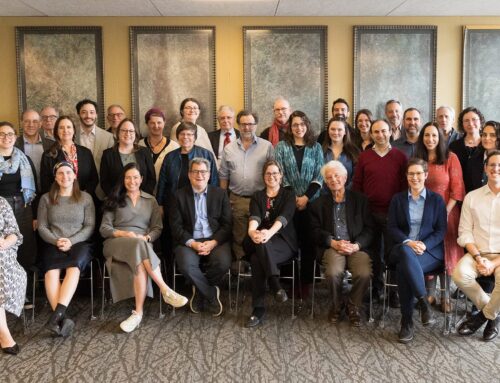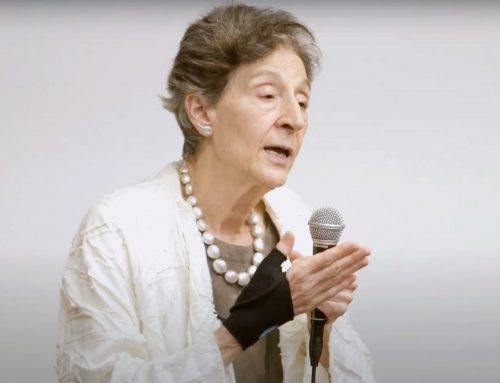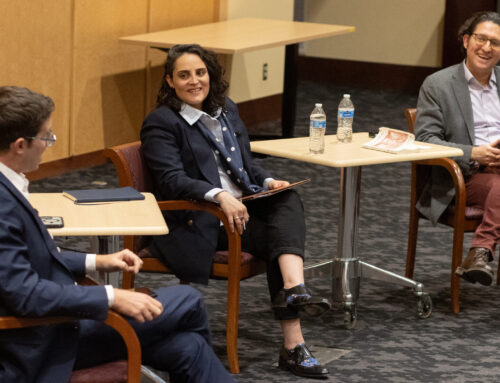Dara Horn and Ilan Stavans spoke with Adam Rovner about Hebrew in American Jewish culture and in the academy.
What is the future of Hebrew language study on American campuses–and how does this reflect upon the state of the humanities in general?
These questions were the focus of a special conference that took place at the University of Washington in the Spring of 2016. “Hebrew and the Humanities: Present Tense” used Hebrew as a case study to explore broader issues about higher education in the United States, with the goal of showcasing the value of language learning as a way of engaging with other cultures. The discussion also addressed the challenges facing the humanities in an academic climate that favors STEM fields and pre-professional training.
The “Hebrew and the Humanities” symposium took place in conjunction with the 2016 Samuel and Althea Stroum Lectures (visit our updated Stroum Lectures Archive to view these Lectures, or catch up on previous installments). The 2016 Stroum Lectures were presented by two scholars, each of whom considered a common theme: “Hebrew and the Creative Imagination.” Prominent American Jewish author and scholar Dara Horn, currently a visiting professor at Harvard University, spoke on May 23; Mexican-American author and scholar Ilan Stavans, a professor at Amherst College, spoke on May 24th.
As part of the May 24 symposium, participant Adam Rovner interviewed Dara Horn and Ilan Stavans about the past, present, and future of the Hebrew language in the United States and in higher education. The two 2016 Stroum Lecturers had a lot to say. Check out the full interview above, or watch some thought-provoking excerpts:
Dara Horn frankly tackled the question of whether American Jews are especially ignorant when it comes to their Hebrew knowledge:
Horn also argued that English is very much a Jewish language– American Jews are continually infusing the language with Hebrew terms and concepts:
Ilan Stavans explained how–in contrast to widespread Jewish hand-wringing about assimilation and lack of Hebrew knowledge–other cultural groups see Jews as a model for language preservation and cultural transmission:
Stavans also likened modern Hebrew to Spanglish in the American Southwest and in Mexico, arguing that all languages are always in a state of flux:
“Hebrew and the Humanities” symposium participants also wrote short articles reflecting on how their connection to Hebrew has impacted their personal and professional lives. Popular posts from this series include “What’s in a (Hebrew) Name?,” by Professor Naomi Sokoloff, “My First Hebrew Test” by Dara Horn, and “American Jews and Hebrew: A Case of Active Resistance” by Professor Michael Weingrad. See all of the articles in this series.
The symposium’s organizing committee consisted of Prof. Naomi Sokoloff and Dr. Hannah Pressman of the UW, and Prof. Nancy Berg of Washington University in St. Louis. These three scholars will also be co-editing the volume inspired by the conference, which will be published by University of Washington Press.
Prof. Sokoloff described the gathering as a rare chance to discuss Hebrew’s value with a cohort of accomplished American scholars who embraced the language. Said Sokoloff, “I am excited that this symposium will bring together a group of non-native speakers who have devoted much of their teaching and scholarship to Hebrew and Hebrew culture. Why do they do it? What is its value? What have they gained? I hope they will help our audience (and especially our students) realize how learning this extraordinary language can provide significant cognitive benefits, open cultural horizons, enrich personal experience, enhance intellectual pursuits, and even — sometimes — pay off practically and professionally.”
This past spring the Simpson Center awarded the Stroum Center a generous grant in recognition of the symposium’s cross-disciplinary focus. Said Stroum Center Associate Director Dana Rubin, “We are especially excited to partner with the Simpson Center for the Humanities on bringing such outstanding public scholarship to campus,” said Rubin.
The Stroum Center thanks all of the event cosponsors for helping to make “Hebrew and the Humanities” possible: the Simpson Center for the Humanities at UW, Department of Near Eastern Languages and Civilization at UW, and the Department of Comparative Literature, Cinema & Media at UW.
Links for Further Exploration
- What’s in a (Hebrew) Name? by Naomi Sokoloff (Oct. 23, 2015)
- The Hidden One of N.J.: Why Dara Horn is the Best of the New Breed of Jewish Novelists by Saul Austerlitz (Tablet Magazine, Sep. 9, 2013)
- Review of Ilan Stavans’ Resurrecting Hebrew (Jewish Book Council)






